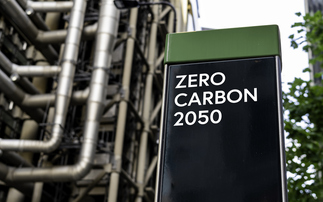
Thomas Guillot, CEO of the Global Cement and Concrete association reflects on an eventful 12 months and the organisation's ambitious road map to net zero emissions
What green achievement are you most proud of over the past year?
In the past 12 months we've made great progress to become a more sustainable industry. Our most important achievement was the development and launch of our 'Net Zero' roadmap towards the end of 2021, which was the first detailed net zero pathway of any of the global 'heavy' industries.
The roadmap, which was agreed by all of our members and endorsed by the UN and WEF, sets out our path to net zero concrete by 2050 and includes an intermediate goal of cutting our CO2 emissions by a quarter by 2030. Our work in the last six months has been fully focused on implementation of the plan.
What is the biggest environmental challenge facing your business and how do you plan to overcome it?
As an organisation representing a global industry, the biggest challenge is to ensure our net zero aims and objectives are achievable across different markets and regions. The decarbonisation challenge looks different depending on which country you look at, as factors like existing infrastructure, local policy, availability of materials and levels of industrialisation all vary significantly.
To address this challenge, we are working at a local level to help produce and deliver national roadmaps that take into account the specific needs of each country. These national roadmaps are a key part of our Net Zero Accelerator initiative, the first set of which we launched earlier this year and included Egypt, India, Thailand, and Colombia.
What area of the green economy are you most excited by, where do you see the biggest opportunities?
According to the UN Secretary General, 75 per cent of the infrastructure that the world will need by 2050 is yet to be built. Therefore, the next few years represent an opportunity to use new technology, innovative methods of construction such as 3D printing, and enhancing design techniques to create sustainable and long-lasting roads, buildings, bridges, and more. We're going to see increased collaboration between designers, policymakers, and the wider construction industry to develop new ways of working and to truly overcome the environmental challenges.
One area of sustainable innovation that's truly exciting is the continuing development of carbon capture, utilisation and storage (CCUS). There are an ever growing number of pilots and initiatives underway across the world that are already demonstrating that the technology works. Over the next years our industry will move towards full scale industrial deployment of CCUS.
How is your organisation working to accelerate the net zero transition?
As the most widely used material in the world after water, concrete is ubiquitous around the world in things such as schools, roads, wind turbines, houses, tunnels, and hospitals. It is essential to the modern world. But we are also acutely aware of the environmental impact of the use it has, which is why we convened leading companies, stakeholders and policymakers to produce the 'Net Zero' roadmap for the cement and concrete industry.
We are very proud of a recent initiative, working with start-ups both within and outside the industry, who are at the cutting edge of innovation. In May this year we revealed the first six sustainable start-ups that are being backed by our member companies, as part of our Innovandi Open Challenge.
What do you think the net zero emission economy will look like in 2050?
Nobody fully knows what 2050 will look like in practice but I can say that I am very confident that our industry will not only have decarbonised but will also be contributing more widely to a net zero society with intelligent and energy efficient buildings, clean energy networks and resilient infrastructure that the world needs. This is not without hard work but by uniting as an industry and working with key partners beyond our sector such as governments, city planners, architects as well as tech start-ups, together we really can build the sustainable world of tomorrow.
The Global Cement and Concrete Association was a finalist at this year's BusinessGreen Leaders Awards.








